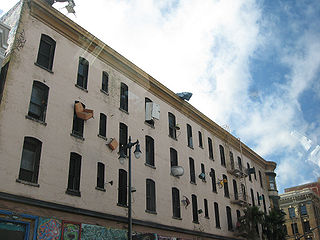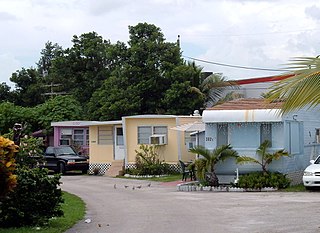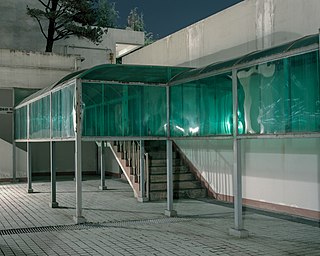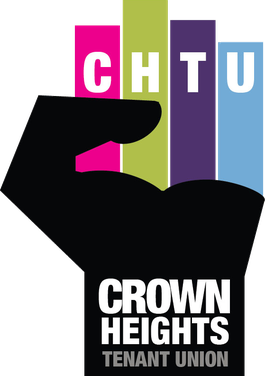In the United States, rent control refers to laws or ordinances that set price controls on the rent of residential housing to function as a price ceiling. More loosely, "rent control" describes several types of price control:

Single-room occupancy (SRO) is a type of low-cost housing typically aimed at residents with low or minimal incomes, or single adults who like a minimalist lifestyle, who rent small, furnished single rooms with a bed, chair, and sometimes a small desk. SRO units are rented out as permanent residence and/or primary residence to individuals, within a multi-tenant building where tenants share a kitchen, toilets or bathrooms. SRO units range from 7 to 13 square metres. In some instances, contemporary units may have a small refrigerator, microwave, or sink.
Landlord harassment is the willing creation, by a landlord or their agents, of conditions that are uncomfortable for one or more tenants in order to induce willing abandonment of a rental contract. This is illegal in many jurisdictions, either under general harassment laws or specific protections, as well as under the terms of rental contracts or tenancy agreements.

The Mitchell–Lama Housing Program is a non-subsidy governmental housing guarantee in the state of New York. It was sponsored by New York State Senator MacNeil Mitchell and Assemblyman Alfred A. Lama. It was signed into law in 1955 as The Limited-Profit Housing Companies Act.

Utility sub-metering is a system that allows a landlord, property management firm, condominium association, homeowners association, or other multi-tenant property to bill tenants for individual measured utility usage. The approach makes use of individual water meters, gas meters, or electricity meters.
CitiApartments was one of the largest real estate companies in San Francisco, California, which at its peak owned and managed more than 300 buildings directly and through a number of affiliates. In recent years the companies suffered a financial downturn, and have been the subject of intense criticism and litigation for allegedly illegal business practices as a residential landlord.
Equity Residential is a United States-based publicly traded real estate investment trust that invests in apartments.
Rent regulation in New York is a means of limiting the amount of rent charged on dwellings. Rent control and rent stabilization are two programs used in parts of New York state. In addition to controlling rent, the system also prescribes rights and obligations for tenants and landlords.

A basement apartment is an apartment located below street level, underneath another structure—usually an apartment building, but possibly a house or a business. Cities in North America are beginning to recognize these units as a vital source of housing in urban areas and legally define them as an accessory dwelling unit or "ADU". Rent in basement apartments is usually much lower than it is in above-ground units, due to a number of deficiencies common to basement apartments. The apartments are usually cramped, and tend to be noisy, both from uninsulated building noises and from traffic on the adjacent street. They are also particularly vulnerable to burglary, especially those with windows at sidewalk level. In some instances, residential use of below-ground space is illegal, but is done anyway in order for the building owner to generate extra income.

Graham Court is a historic apartment building in Harlem, Manhattan, New York City, along Adam Clayton Powell Jr. Boulevard between West 116th and 117th Streets. It was commissioned by William Waldorf Astor, designed by the architects Clinton and Russell, and constructed in 1899-1901 as part of the great Harlem real-estate boom.

The Belnord is a condominium building at 225 West 86th Street on the Upper West Side of Manhattan in New York City. The 13-story structure was designed by Hiss and Weekes in the Italian Renaissance Revival style and occupies the full block between Broadway, Amsterdam Avenue, and 86th and 87th Streets. It was built between 1908 and 1909 by a syndicate of investors as a rental apartment building. The Belnord is a New York City designated landmark and is listed on the National Register of Historic Places.
Rent regulation is a system of laws for the rental market of dwellings, with controversial effects on affordability of housing and tenancies. Generally, a system of rent regulation involves:
The Costa–Hawkins Rental Housing Act ("Costa–Hawkins") is a California state law, enacted in 1995, which places limits on municipal rent control ordinances. Costa–Hawkins preempts the field in two major ways. First, it prohibits cities from establishing rent control over certain kinds of residential units, e.g., single-family dwellings and condominiums, and newly constructed apartment units; these are deemed exempt. Second, it prohibits "vacancy control", also called "strict" rent control. The legislation was sponsored by Democratic Senator Jim Costa and Republican Assemblymember Phil Hawkins.
Laurence Gluck was an American businessman, investor, and lawyer. He was based in New York who was the founder of the real estate company Stellar Management.

The Crown Heights Tenant Union (CHTU) is a tenants union created in October 2013 to unify old and new tenants against the gentrification of the neighborhood of Crown Heights, Brooklyn, New York City. The CHTU has pushed for local collective bargaining agreements between tenants and landlords to be written into the deeds of buildings that would regulate rent increases and codify repair and renovation standards. They also assist individual tenants, educating them on their rights and how to enforce them, lobby in Albany for better rent laws, and participate in direct action, targeting predatory equity real-estate companies they believe to be involved in illegal evictions and harassment tactics.
The 421-a tax exemption is a property tax exemption in the U.S. state of New York that is given to real-estate developers for building new multifamily residential housing buildings in New York City. As currently written, the program also focuses on promoting affordable housing in the most densely populated areas of New York City. The exemption is granted for any buildings that add multiple new residential units, and typically lasts for 15 to 25 years after the building is completed. Longer exemption periods apply in less densely populated areas of the outer boroughs and upper Manhattan.
Joel Saul Wiener is an American real estate developer and landlord, and the CEO of Pinnacle Group.
The Housing Stability and Tenant Protection Act of 2019 (HSTPA) is a New York state statute that introduced major changes to landlord-tenant law.
The New York State Division of Housing and Community Renewal (DHCR) is an agency of the New York state government responsible for administering housing and community development programs to promote affordable housing, community revitalization, and economic growth. Its primary functions include supervising rent regulations through the State Office of Rent Administration (ORA), administering affordable housing programs, providing financial assistance for housing development and rehabilitation, supporting community development initiatives, ensuring compliance with fair housing laws, and managing the Weatherization Assistance Program. DHCR has been criticized by tenant rights groups for its failure to monitor their own programs and massive delays in investigating cases of the illegal deregulation due to an extensive backlog.
Rent control in Massachusetts was a means of limiting the amount of rent charged on dwellings. There have been three instances where rent control was implemented: after World War I, after World War II, and between 1970 and 1994.







